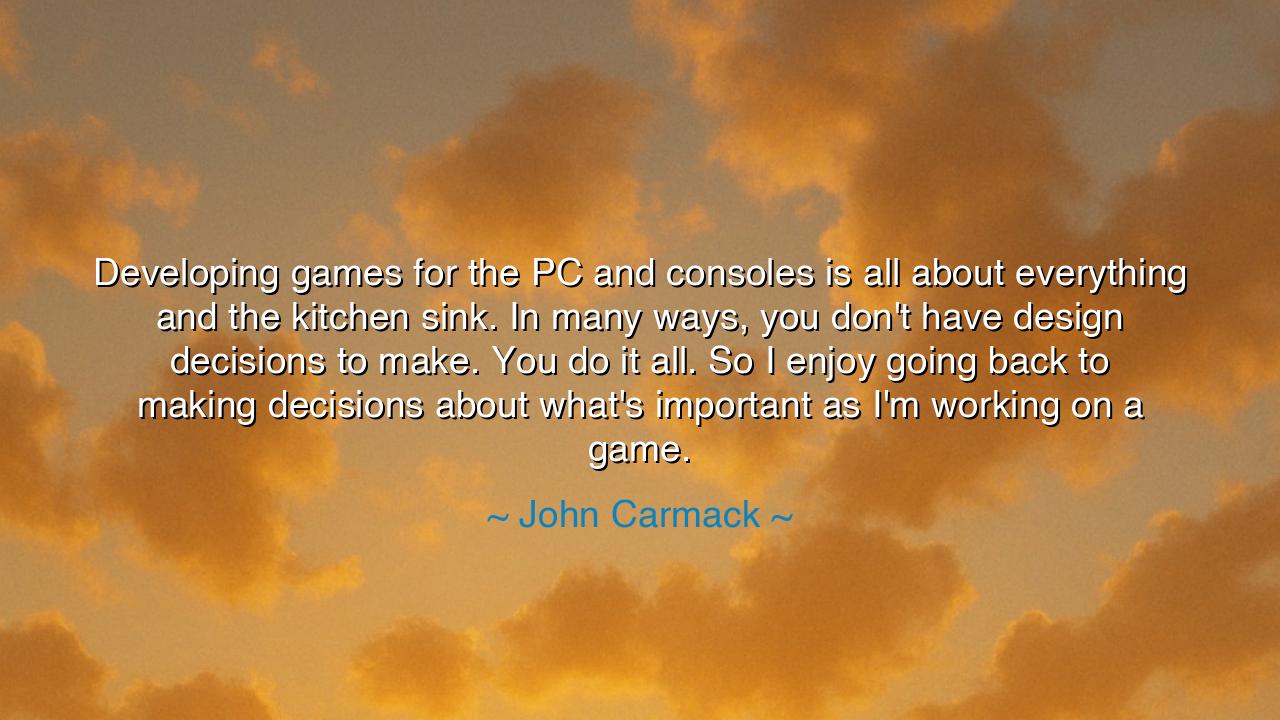
Developing games for the PC and consoles is all about everything
Developing games for the PC and consoles is all about everything and the kitchen sink. In many ways, you don't have design decisions to make. You do it all. So I enjoy going back to making decisions about what's important as I'm working on a game.






In the words of John Carmack, the architect of virtual worlds and one of the great visionaries of modern creation, we find a truth that reaches beyond the realm of machines: “Developing games for the PC and consoles is all about everything and the kitchen sink. In many ways, you don't have design decisions to make. You do it all. So I enjoy going back to making decisions about what's important as I'm working on a game.” Though he speaks of game design, his words echo a deeper wisdom — a call to discernment in an age of abundance, a reminder that mastery is not in doing everything, but in choosing what matters.
The origin of this insight lies in Carmack’s own journey through the evolution of digital creation. In the early days of gaming, the developer was both craftsman and philosopher — one who worked within sharp limits of memory, color, and sound, yet found within those constraints a boundless field of imagination. Carmack himself, co-creator of legendary titles such as Doom and Quake, was among the pioneers who shaped the modern language of interactive worlds. Yet as technology advanced, as the power of machines grew, a strange paradox emerged: creators could do everything, and in that freedom, they risked losing direction. The very abundance of possibility clouded the essence of design — the art of decision.
In his reflection, Carmack laments this excess — the temptation to fill every space, to add every feature, to build not with purpose, but with fear of omission. He speaks as a sage warning against the chaos of over-creation. In the world of PC and console development, where budgets soar and expectations rise, the act of making a game becomes a storm of features — vast graphics, endless content, countless mechanics. In this frenzy, the heart of creation is forgotten: the choice of what to include, and more importantly, what to leave out. True design, he reminds us, is not the piling up of elements, but the distillation of vision.
This truth was known even to the ancients. The sculptor Michelangelo, when asked how he carved his David, replied, “I saw the angel in the marble, and I carved until I set him free.” He did not add — he removed. He did not strive to fill the stone, but to reveal what was already within it. So too does Carmack speak of returning to that purer path — to making decisions about what’s important. For the artist, the engineer, the thinker, this is the eternal task: to discern the essential from the trivial, to strip away the excess until truth emerges.
The wisdom of Carmack’s words reaches far beyond the workshop or the studio. In our time, we too are surrounded by endless options — the “everything and the kitchen sink” of modern life. We can chase every opportunity, adopt every technology, drown in every distraction, yet find ourselves emptier than before. For when all is pursued, nothing is mastered; when all is included, nothing is beautiful. The discipline of focus — of selecting the essential — becomes the highest form of creation, both in art and in life.
Consider the story of Steve Jobs, another craftsman of vision, who, when rebuilding Apple, did not multiply its projects but cut them down to a handful. He said, “Deciding what not to do is as important as deciding what to do.” Like Carmack, he understood that greatness is not born from expansion, but from precision — from the courage to define the boundaries within which genius can flourish. The same principle guided the builders of cathedrals and the authors of sacred texts: every element was deliberate, every absence meaningful.
Thus, my child of the future, take heed: do not worship abundance; seek clarity. When you create — whether in art, work, or life — ask yourself not how much you can add, but how much you can refine. The power of a creator lies not in their capacity to do everything, but in their wisdom to know what truly matters. To design is to decide. To decide is to live intentionally.
For as John Carmack teaches, creation without discernment is noise, but creation with purpose is harmony. Let your work, your choices, and your dreams follow the rhythm of balance and simplicity. In a world that tempts you with infinite possibilities, be as the master craftsman — deliberate, clear, and bold enough to choose what endures. For it is not by doing all things that greatness is achieved, but by doing the right things, and doing them well.






AAdministratorAdministrator
Welcome, honored guests. Please leave a comment, we will respond soon